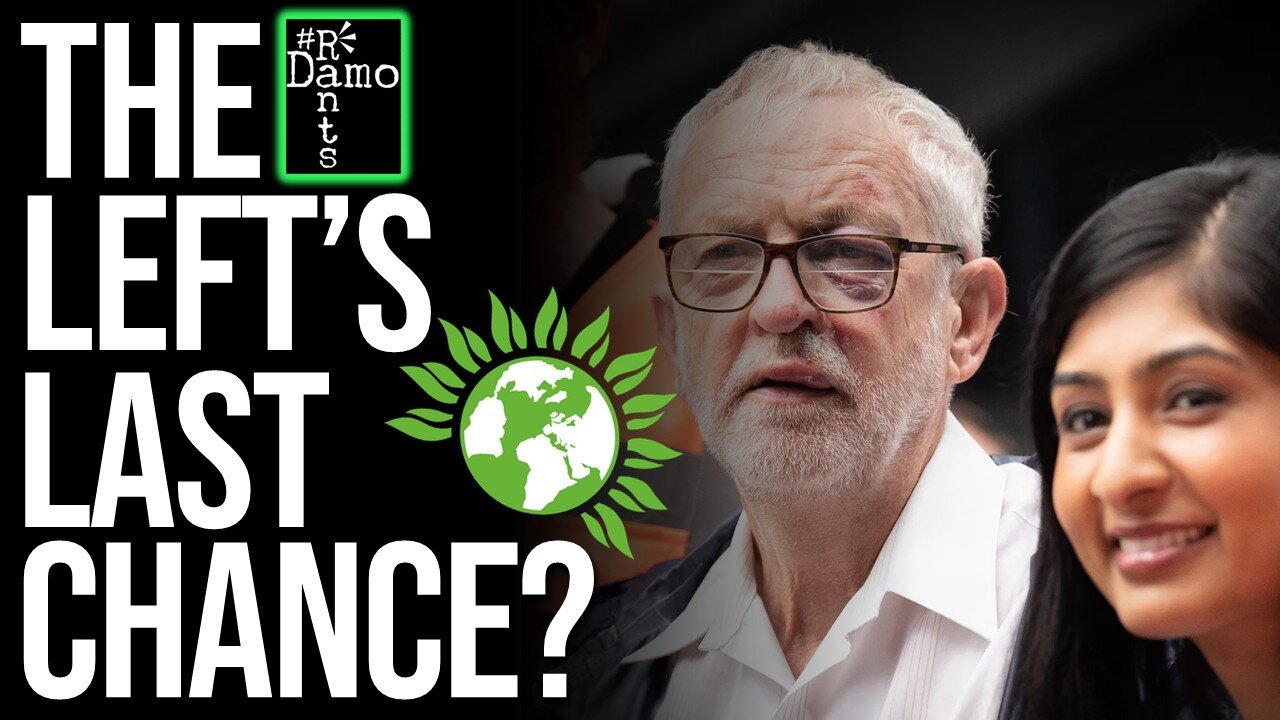Premium Only Content

They Mocked Corbyn’s ‘Party With No Name’ – Now 300,000 Have Joined
Right, so a party with no name, 230,000 members at time of writing, and the entire right-wing press doing its advertising for free—it sounds like the set-up to a bad political joke doesn’t it? But the punchline may be on Keir Starmer and Nigel Farage. Jeremy Corbyn and Zarah Sultana’s fledgling movement, mocked as chaotic and amateurish, has done what Labour has not managed in years: ignited real excitement among disillusioned voters. At the same time, the Green Party is experiencing its own grassroots surge under Zack Polanski, who has been branded a ‘firebrand’ by his own colleagues for daring to talk to Corbynites, talk the language of them even. Whether this is the start of a genuine left-wing realignment or just another protest fad depends on one question: will these forces cooperate, or will they waste this historic moment squabbling while Starmer and Farage divide the spoils?
Right, so Jeremy Corbyn, the former Labour leader ousted and vilified by his own party under Keir Starmer, has joined forces with Zarah Sultana, one of Labour’s most popular young MPs, who Starmer also didn’t care for, so she’s gone too, to launch a new political party. Yet the launch was ridiculed by much of the media because of one fairly unusual detail: the party did not even have a name. It still doesn’t. People signing up will decide it at a Conference in the autumn, but for now it has the placeholder title of ‘Your Party.’
Over this, the right wing hack rags had a field day. The Times mocked the venture as amateurish, running a headline that described the initiative as “confused,” while Sky News gleefully reported on the “messy” start. Right-wing commentators had to put the boot in too. The Murdoch Scum’s editor at large, certainly not a journalist though, proper ones would never work for that rag Harry Cole, went with some Magic Grandpa nonsense, Jewish News hack Lee Harpin bleated about Israel hatred being what unites them, well, I daresay after 21 months of genocide a few people feel like that about Israel Lee, but you get the picture. Corbyn’s back and on the menu for this sorry bunch of people who allegedly provide us with news.
But the mockery spectacularly backfired. Within five hours of the launch, more than 80,000 people had signed up to the new movement. By this morning, that figure had soared to around 200,000, and now sits at 230,000 at time of writing, dwarfing even the early membership surges of Reform UK and far exceeding expectations I daresay, for a fledgling political force.
What made this surge even more remarkable was that it was driven not by expensive advertising campaigns or slick branding but by the very media coverage intended to undermine it. The right-wing press handed Corbyn and Sultana thousands of pounds’ worth of free publicity essentially. In trying to portray the movement as incompetent, it had instead made it a talking point across the country. The temporary name, “Your Party,” has nevertheless been embraced by grassroots supporters as a symbol of democratic ownership rather than as a sign of organisational chaos as the media wishes to paint it. The lack of a name just didn’t matter.
This launch marks one of the most significant left-wing insurgencies since Corbyn’s own Labour leadership campaign in 2015 and has already begun reshaping the conversation about Britain’s political future. Yet this new party exists in a political ecosystem that is hostile to new entrants, particularly under first-past-the-post. It isn’t the only insurgency though. The Greens, meanwhile, are undergoing their own transformation. Zack Polanski’s leadership campaign has driven record membership growth there too, signalling a desire among Green activists, many of us having joined the Greens after Starmer lied his way into power within the Labour Party, for a broader, more populist left-wing approach. But a fierce internal battle threatens to close the door to potential cooperation with Corbyn’s new movement, but I’ll come onto that in a moment.
The left’s reawakening did not emerge from nowhere; it is the product of a decade of political betrayal, economic hardship, and growing anger at Britain’s deeply unequal system. Keir Starmer’s Labour Party, which swept to power on promises of competence and ethical government, itself a pack of lies built on the lies that got Starmer to the position of Labour leader, with the purges of socialists that instead followed, has governed as little more than a continuation of the Conservative project. His refusal to scrap the Tory-era two-child benefit cap, his endorsement of arms sales to Israel during the Gaza genocide, and his broader pro-business positioning have alienated millions of Labour’s former supporters.
As Al Jazeera reported on the day of the launch, Corbyn’s decision to form a new party was fuelled by “years of Starmer purging the left from Labour,” a campaign that expelled or marginalised many of its most popular grassroots figures. Starmer has not merely disappointed the left; he has actively sought to delegitimise it. The former Labour leader, who attracted 12.9 million votes in 2017, compared to Starmer only getting 9.7 million, such is the stupidity of first past the post, was treated as a political liability despite representing Labour’s biggest surge in four decades. The expulsion of left-wing MPs like Sultana and the disciplining of pro-Palestine voices – the criminalising of them even - reinforced the perception that Labour under Starmer was indistinguishable from the Conservatives on many core moral questions and actually is even more right wing than them on some too.
Economic conditions have created fertile ground for this disillusionment to turn into political rebellion therefore. The UK is in the grip of a cost-of-living crisis, with wages stagnating, public services collapsing, and wealth inequality soaring. Reform UK has successfully channelled some of this anger by posing as the anti-establishment alternative, but its solutions are rooted in xenophobia and austerity rather than redistribution. In the absence of a strong left-wing alternative, Farage has been allowed to monopolise working-class discontent.
Corbyn and Sultana’s new party therefore arrives at a moment of profound political volatility. The appetite for change is high, but so too is the risk of fragmentation. So the left must prove it can channel this energy into electoral power, not just protest and that requires working with others on the left too, as a Collective you might say.
There’s no denying the sheer speed and scale of the new party’s growth surprising I daresay even its founders. Within hours of launch, tens of thousands signed up; 24 hours on the figure now stands at 230,000, so so much for the jeering and booing by silver spoon alleged journalists in the mainstream, please carry on doing it if this is how the left is getting a boost. This is not just a large number; it is an unprecedented early-stage surge for a UK political party.
This level of grassroots engagement mirrors the Corbynite surge of 2015–2017 but its also different in a number of key ways. Unlike Corbyn’s previous Labour leadership, which was constrained by party machinery actively working and conspiring against him, this new formation is designed to be bottom-up. Through the “Your Party” website, supporters will be able to decide everything at an upcoming conference, where they can propose policies, debate them publicly, and even vote on the party’s permanent name, which we will all be looking forward to finding out I’m sure.
But the media’s attempt to portray this as amateurish only served to amplify interest as aforementioned. Social media users turned the insult into a badge of honour, declaring that this was the party the establishment is already running scared of. In a political age that has been dominated by disappointment, dishonesty and cynicism, the very lack of slick branding has almost become an asset, symbolising authenticity and grassroots enthusiasm, whilst the right wing, who could not help themselves, provided free advertising.
Yet enthusiasm alone will not overcome the structural barriers of FPTP, though obviously the Reform UK surge, shows it can be done. Without strategic alliances though, this mass movement nevertheless still faces very real risks of becoming another left-wing protest vehicle that changes discourse but wins few seats.
At the same time, the Green Party of England and Wales is experiencing its own surge. Membership has climbed to over 65,000, its highest level in a decade, thanks largely to Zack Polanski’s leadership campaign. Polanski has argued that the Greens must expand beyond their traditional middle-class environmental base and embrace an “eco-populist” strategy, positioning the party as the left-wing alternative for disillusioned Labour voters. He has, prior to this new party launch, openly called on Corbyn supporters to join the Greens, signalling a willingness to build alliances with the left.
But this vision faces fierce internal opposition. Adrian Ramsay, running for re-election alongside Ellie Chowns, has attacked Polanski for having courted Corbyn’s supporters, warning that Corbyn’s party would “wreck” Polanski’s strategy and to back him and Chown’s instead if they want to keep the Greens separate from Corbyn’s movement, having already distanced himself from Polanski, by claiming his parliamentary position makes him best placed to lead, despite no Green party leader ever having been elected whilst already being an MP and that parliamentary establishment positioning is exactly what turns so many of us on the left off. This is not just a tactical difference; it represents two completely competing visions for the party’s future. A Ramsay-Chowns victory would likely lock the Greens into a cautious electoral strategy, focusing on incremental rural and suburban gains, basically where the Greens are now, not insignificant at all, but not growing any faster, whereas a Polanski win could transform the party into a key player, which will demand far more media attention, won’t go ignored, presents a vision for change for the country and just thinking a lot bigger in my mind and arguably that could be as part of a wider progressive alliance, something I very much doubt Ramsay and Chowns would ever countenance.
The Green leadership result, due in September, just a week to go to vote in that, so by all means joining the Greens is still a good move, you can vote in that election, will therefore determine whether left unity is even possible.
The strategic case for a progressive alliance under FPTP is overwhelming. The electoral system is designed to punish fragmentation. Even if Corbyn’s party and the Greens poll a combined 15–20% nationally, running against each other in the same constituencies will allow Labour or Reform UK to win with as little as 35–40% of the vote.
The threat from Reform UK makes this unity even more urgent. Nigel Farage has positioned Reform as the voice of working-class protest, but its solutions—privatisation, anti-immigration rhetoric, tax cuts for the rich—offer nothing to those struggling with the cost-of-living crisis. They are more of the same, just with more racism and pointing at small boats, instead of the private jets and yachts that need to be pointed at instead. Your enemy doesn’t come by small boat, it comes by private jet. A united left alliance, with a clear message on wealth redistribution, climate justice, and public ownership, could reclaim the anti-establishment mantle from these snake oil salesmen.
For a progressive alliance to succeed, it does not need to be a formal coalition. Tactical cooperation is enough. Corbyn’s party could focus on urban working-class seats where Labour has grown complacent, while the Greens could concentrate on university towns and rural progressive areas where they may already have a base. Common sense should dictate. Joint campaigning on key issues such as public ownership, renationalisation, Palestine solidarity, and climate action would demonstrate a shared platform, Corbyn and Polanski have already done this, helping voters see them as complementary rather than competing forces and for me that is essential.
Building trust through local-level cooperation—such as mutual endorsements in council elections—could lay the groundwork for deeper collaboration in the future. Historical precedents exist: informal Labour-Green arrangements in 2017 helped attempt to unseat Conservatives in several marginal seats, the most notable example being the attempt to take out Iain Duncan-Smith where the Greens stood down.
If cooperation fails, the outcome is predictable. Labour consolidates the centre-left by default, Reform UK entrenches itself as the main voice of protest, and Corbyn’s party risks becoming another short-lived insurgency. The Greens, if Ramsay wins, could alienate the very voters Polanski has attracted, leaving them stuck as a niche environmental party rather than a transformative force.
If unity succeeds, the prize could be historic. A united left bloc could win enough seats to hold the balance of power in a hung parliament, maybe even taking power – it really is down to the party leaders and what they do going forwards that will dictate this, using that leverage to demand proportional representation. Such a reform would permanently break the stranglehold of FPTP, the stranglehold of the two party consensus which fails us election after election, giving the left a path to sustainable growth and governments truly representative of the people.
So for my money. the left stands at a crossroads at this point. Corbyn and Sultana’s movement has already mobilised 200,000 people without even having a name, fuelled by grassroots energy and widespread disillusionment with Labour. The Greens are also at a turning point, with Zack Polanski offering a path towards unity and Adrian Ramsay pulling in the opposite direction. A guy that couldn’t even say he liked Polanski on radio the other day, his own party’s deputy leader.
If these forces unite, they could build the most significant left-wing insurgency since 1945, challenging Labour’s complacency, blunting Reform UK’s rise, and perhaps even forcing the introduction of proportional representation. If they fail, well we already saw what happened to Corbyn once and the price we’re now paying for a Starmer led government. If they fail, they risk condemning Britain to another decade of centrist drift and right-wing populism, with the blight on all of our lives that that will be.
So the choice is very clear and most pertinent to those with a say in either party right now: either shape history—or condemn the country to more of the same. For me an alliance going forward of some form, is a must. We can’t have the left being split yet again.
For more of what is at stake, just look at Starmer’s authoritarianism as exemplified by police actions right now, where 76 year old socialist legends get arrested for being pro Palestine, whilst fascists in Epping protesting asylum seekers, got largely unbothered. Check out that story in this video recommendation here as your suggested next watch.
Please do also hit like, share and subscribe if you haven’t done so already so as to ensure you don’t miss out on all new daily content as well as spreading the word and helping to support the channel at the same time which is very much appreciated, holding power to account for ordinary working class people and I will hopefully catch you on the next vid. Cheers folks.
-
 8:13
8:13
Danny Rayes
1 day agoMost Hated Teacher on Tiktok
340 -
 15:31
15:31
Chris Harden
9 days agoWhat Happened to Kewanee, Illinois?
822 -
 10:13
10:13
JohnXSantos
1 day agoThis AI Tool Makes Product Manufacturing 10X Smarter (FOR FREE)
7651 -
 16:28
16:28
Artur Stone Garage
12 days ago $0.15 earned$1000 AUDI A4 — WILL IT START After 10 Years?
1.22K -
 26:57
26:57
Advanced Level Diagnostics
18 days ago2021 Ram Promaster - No Crank! Key Stuck In Ignition! Diag & Fix!
47 -
 8:11
8:11
MattMorseTV
16 hours ago $12.23 earnedTrump's DECLARATION of WAR.
30.8K80 -
 3:44
3:44
GritsGG
15 hours agoUpdate Your Warzone Loadouts w/ These Tips!
12.7K1 -
 2:31:01
2:31:01
The Connect: With Johnny Mitchell
17 hours ago $10.39 earned"It's About To Get Worse"- CIA Agent Andrew Bustamante Explains Why It's Time To Leave America
21.3K29 -
 36:28
36:28
TruthStream with Joe and Scott
1 day agoMark Attwood joins TruthStream in Ireland by the lake to discuss all things from Crowley to Ireland to UFOs
14.2K32 -
 2:13:30
2:13:30
Side Scrollers Podcast
1 day agoUK Introduces MANDATORY Digital ID + Dallas ICE Shooting BLAMED on Gaming + More | Side Scrollers
197K61